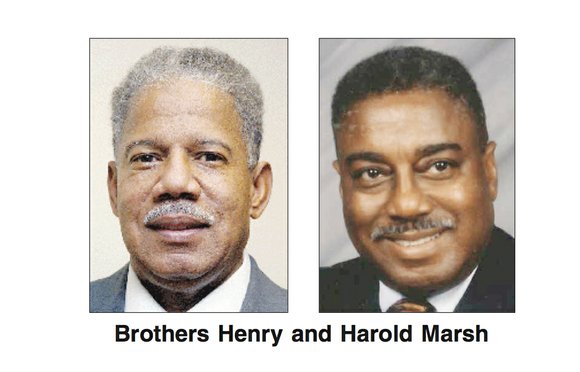Manchester Courthouse to be renamed for Marsh brothers on May 20
Jeremy M. Lazarus | 5/20/2016, 8:24 a.m.
It took 16 months, but the long-awaited public ceremony to rename the Manchester Courthouse for Richmond’s first African-American mayor, Henry L. Marsh III, and his late brother, Harold M. Marsh Sr., will take place Friday, May 20.
Mayor Dwight C. Jones, who proposed the renaming, will lead the 4 p.m. rededication of the building at 920 Hull St. in South Side.
The event will feature the unveiling of a new sign with the names of the sibling lawyers who are credited with major contributions to the political and civic life of the city.
Along with Mayor Jones, speakers will include Congressman Robert E. “Bobby” Scott, D-3rd; U.S. District Court Judge Raymond A. Jackson; Richmond District Court Chief Judge D. Eugene Cheek Sr.; Old Dominion Bar Association President Helivi L. Holland; and Richmond Bar Association President Vernon E. Inge.
Mr. Marsh and his niece, Dr. Erica E. Marsh, daughter of Harold Marsh, also are to speak.
Richmond City Council endorsed Mayor Jones’ renaming plan in January 2015, but the ceremony was delayed to give the Marsh family time to assemble for the program.
Henry Marsh served on Richmond City Council for 25 years and, in 1977, became the first African-American mayor of Richmond. He was elected mayor by council colleagues after Richmonders voted into office the first African-American majority on City Council.
In 1991, he gave up his council seat after winning election to the state Senate from the 16th District, stretching from Richmond to Petersburg. Repeatedly re-elected, he resigned in 2014, after Gov. Terry McAuliffe appointed him as a commissioner of the Virginia Alcoholic Beverage Control Board.
As an attorney, Mr. Marsh successfully fought numerous legal battles on the civil rights front as a partner in the renowned law firm of Hill, Tucker & Marsh, which is now closed.
Harold Marsh, also a partner in the law firm, earned a reputation for community service through his various roles as an attorney, as a substitute judge in the Richmond General District Court and as a supporter of Thomas Jefferson High School and its athletic teams long after his children had graduated. He was shot to death in August 1997 by a person embittered over the results of a civil suit.







